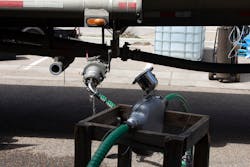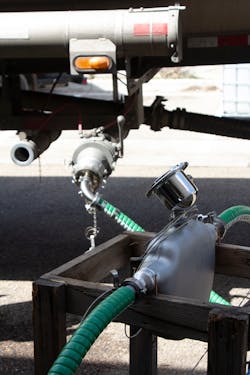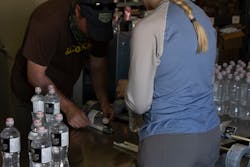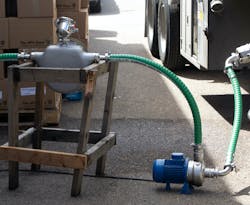Case Study: Flowmeter offers solution for sanitizer production
COVID-19 has caused rapid changes to the way businesses operate. Even people working at a company that has been designated as essential to keeping critical infrastructure going are looking for ways to make a difference in their communities.
At the Emerson facility in Boulder, Colorado, employees recently had an opportunity to help their community, and in a small way, contribute to helping first responders and hospital workers during this critical time.
A Boulder-based distillery — like many others around the country — had made the switch from distilling spirits to producing hand sanitizer; however, the strict guidelines that govern the alcohol percentages and purity levels meant they needed a better measurement device to determine flow into the still. Providing a successful flowmeter installation is where Emerson was able to help out and make a goodwill gesture.
New relationships
The contractor asked Emerson how they could help J&L obtain some valuable equipment, such as a Micro Motion Coriolis meter, to streamline and speed up operations. After just a few internal discussions, Emerson agreed to help out. People from different departments were happy to contribute their time and materials, including constructing a proper stand for the meter to ensure safe operations. The biggest challenge was calibrating a meter to meet the U.S. Food and Drug Administration (FDA) regulations for sanitizer purity. The 1-inch meter needed an enhanced calibration of ±0.05 mass and 0.0002 g/cc density.
The bulk of the sanitizer is being donated to a number of organizations on the front line providing care to the public, such as the Boulder Fire Department, BCH Labor & Delivery Nurses, Boulder Food Rescue, Centura Hospitals, Children First, Cultivate, Denver Zoological Foundation and the National Association of Letter Carriers, to name a few. The rest is sold at various retail locations throughout Boulder.
Meeting stringent guidelines
Just like the strict guidelines required when distilling spirits, the same is true for hand sanitizer. The people working in hospitals and first responders, as well as volunteers at foodbanks and those working with children, need to know the product they are using to stay safe, is safe.
The donated Micro Motion Coriolis ELITE flow meter proved to be the ideal solution for J&L Distillery. It fits the size specifications and is a high-quality Coriolis flowmeter, designed for high accuracy, reliability and repeatability. Features of the all-stainless flowmeter that make it suitable for this specialized application include the hygienic and high-pressure ratings as well as the highest immunity to fluid, process and environmental effects.
Alcoholic beverage production is subject to the Alcohol and Tobacco Tax and Trade Bureau (TTB) rules; however, there are additional guidelines provided by the FDA for producing hand sanitizer in a consumer distillery, which were set out in March in a 12-page temporary policy document, “Temporary policy for manufacture of alcohol for incorporation into alcohol-based hand sanitizer products during the public health emergency (COVID-19).” It clearly spells out the percentage of alcohol from ethanol that is required:
To meet component quality requirements for hand sanitizer production, the alcohol manufactured as an API is not less than 94.9% ethanol by volume.
Any water used to adjust the finished ethanol content in the alcohol API is sterile (e.g., by boiling, distillation or other process that results in water that meets the specifications for purified water USP). Water is used as quickly as possible after it is rendered sterile or purified.
Additional considerations for alcohol (ethanol): Alcohol (ethanol) manufacturer for use in hand sanitizers is derived from distillation or fermentation processes typically used for consumable goods.
Meeting these specific guidelines is where Johnson’s still proved to be ideally suited — as the 17-foot-tall column provides 35 distillation states per pass. The purity of distillate was assured to meet the recommended requirements for consumer-grade hand sanitizer; however, the final product is also pure enough to meet stringent hospital purity requirements, which are higher than for consumer-grade product.
Pivoting to a new reality
Businesses must adapt and find ways to remain relevant in these times. Although we often cannot see the bigger picture of massive changes, helping each other provides a sense of control and stability. In this case, a large, essential corporation takes the time to contribute to the local community, providing a sense of belonging. Within Emerson, the team came together to provide J&L Distilling Company with a Coriolis flowmeter in record time.
Brent Pankonien, senior account representative for the Micro Motion Coriolis Flow & Density products, has been with Emerson since 1990, working first at the Boulder, Colorado, campus as an inside support engineer, global technical trainer and application engineer. In 1995, he transitioned into a sales role in the Rocky Mountain region and works closely with the technical and customer support teams and engineering group to support his customers in the region. Pankonien has also authored and co-authored several Emerson Exchange papers. These papers have covered many industries including food and beverage, oil and gas, chemical, power and mining.Brent Pankonien
Brent Pankonien, senior account representative for the Micro Motion Coriolis Flow & Density products, has been with Emerson since 1990, working first at the Boulder, Colorado, campus as an inside support engineer, global technical trainer and application engineer. In 1995, he transitioned into a sales role in the Rocky Mountain region and works closely with the technical and customer support teams and engineering group to support his customers in the region. Pankonien has also authored and co-authored several Emerson Exchange papers. These papers have covered many industries including food and beverage, oil and gas, chemical, power and mining.





